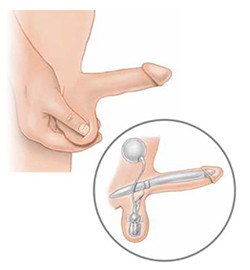
Frequently Asked Questions
About Erectile Dysfunction and Penile Implants
Questions about Erectile Dysfunction
Questions about Penile Implants | Insurance: Am I covered for a Penile Implant?
What is ED?
Erectile dysfunction (ED) is defined as the persistent inability to achieve or maintain a penile erection sufficient for satisfactory sexual performance.6 ED can limit your intimacy, affect your self-esteem, and impact your most important relationships. Beyond the physical manifestations, ED causes emotional damage and there is a strong link found between ED and depression.7
How common is ED?
One in four patients seeking first medical help for new onset ED was younger than 40 years. – The Journal of Sexual Medicine.
At age 40, approximately 40% of men are affected. The rate increases to nearly 70% in men aged 70 years. The prevalence of complete ED increases from 5% to 15% as age increases from 40 to 70 years. - Massachusetts Male Aging Study. J Urol, 1994;151:54–61.
What causes ED?
While there are real physical and psychological reasons for ED, there’s no single cause. The chart below outlines the most common causes of ED. 9

How is ED diagnosed?
You may have to start the conversation with your doctor to get an answer to the question, “Do I have ED?” A personal history and physical exam set the groundwork for most conditions. Lab tests and other tests may identify a source such as diabetes, coronary artery disease or other conditions that affect the nerves and blood flow to the penis.
If I have ED symptoms, could I have heart disease?
Hardening of the arteries caused by plaque buildup – atherosclerosis – limits blood flow to various parts of the body. The arteries supplying blood to the penis are much smaller than the ones supplying blood to the heart. As a result, heart disease may first show itself as difficulty achieving an erection.35 Learn More
Why does diabetes cause ED symptoms?
Diabetes damages the blood vessels and nerves that supply the penis with blood to form an erection. The constant change in blood sugar levels can also cause nerve damage, which can lead to loss of sensation in the feet and hands, and can affect having sex.7 Learn More
What are some of the side effects from prostate cancer treatment?
The two most feared side effects of a radical prostatectomy are loss of erections and bladder leakage. These side effects can occur, but there are successful treatment options available. Also, after total removal of the prostate, there is no ejaculation, although there is the sensation of climax and orgasm. 36 Learn More
When can a man resume sexual activity after prostate cancer treatment?
If the cancer is detected early and patients are treated by an experienced surgeon using nerve-sparing techniques, then sexual activity may return to normal after surgery. This can take three to six months with continued improvement for two or three years.11 If sexual activity does not return on its own, there are many different ways to support an active sex life (medications, pumps, injections and penile implants). Learn More
How is ED treated?
ED treatment is available to all men with ED. Oral medications are a common first step, but they don’t work for everyone. If men don’t respond to oral medications, they may try other options such as pump devices, injections and penile implants.
Questions about Penile Implants
Questions about Erectile Disfunction | Insurance: Am I covered for a Penile Implant?
Will my penis look different to me or will others notice a penile implant?
Once in place, your implant will be completely undetectable. It’s fully concealed in the body. No one will know unless you tell them—even in the locker room.
Is the inflation process painful?
To inflate an implant, you squeeze the pump in your scrotum, which will send fluid into the cylinders in the penis. This requires good manual dexterity but should not be painful. If you experience pain, contact your doctor.37
What will my partner think?
When inflated, the implant makes the penis stiff and rigid, similar to a natural erection. Your erection will last as long as you desire. And you’ll still share the same intimate experience. Typically, ejaculation and sensation will feel similar to the way they felt before the implant.38
Do I need to go to a specialist to get a penile implant?
Eventually, you will need to see an ED specialist. At first you can speak with your primary care doctor about erectile dysfunction treatments. Later, you will discuss the situation with an ED Specialist or clinic with experience in all forms of treatment for ED, including penile implants.37 Locate an ED specialist in your area.

What’s the penile implant surgery like?
Penile implant surgery generally takes about an hour. Typically, it is performed on a short hospital stay basis. While you’re under anesthesia, a small incision is made at the base of the penis or in the scrotum, and the implant is placed through that incision. Most men experience only minor discomfort during the healing process.37
How long is the recovery time after ED surgery, and when can I have intercourse?
Most men return home within a day of ED Implant surgery and are back to all their normal activities within a week, typically having intercourse around 6 weeks post-surgery.37
How long does an implant last? Will I ever need to replace it?
It is impossible to predict how long a particular implant will function in a particular patient. As with any medical device, penile implants are subject to wear and mechanical failure over time. To prolong the life of your implant, follow the advice of your urologist (Andrologist).
Will my implant set off airport security?
An implant should not affect your ability to travel and to go through airport security. Of course, implants like those for knees or hips contain metal and will be detected by a wand or a walk-through scanner. Since most inflatable penile implants have minimal metal parts, they should not set off a metal detector. Some of the non-inflatable penile implants may, however, contain more metal. You will receive a patient ID card that identifies you as a medical device patient. To help avoid these types of situations, just carry it with you.
What are the risks of getting a penile implant?
Because each type of implant offers unique features, you will want to discuss the risks and benefits of each device with your doctor. Then choose the option that is right for you.
Important Safety Information
Your urologist (Andrologist) is your best source for information on the risks and benefits of a penile implant. Talk to your urologist (Andrologist) for a complete listing of risks, warnings and important safety information. Additional information is provided in the product Patient Manuals, available through your urologist (Andrologist).

